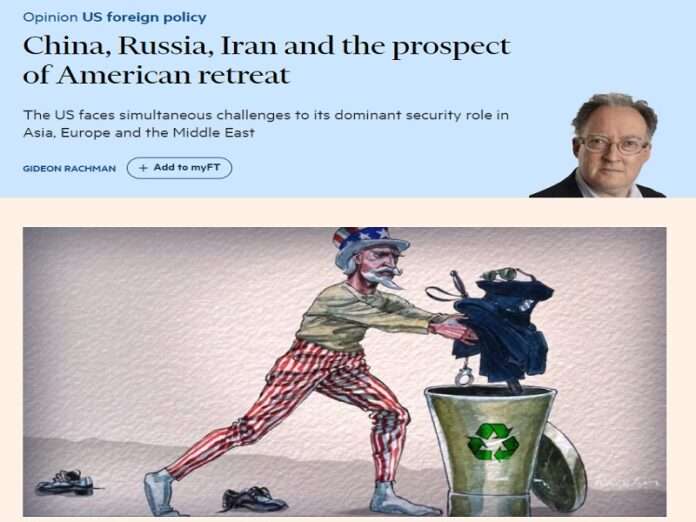The UK’s Financial Times published a piece by Gideon Rachman on Monday fearmongering about “China, Russia, Iran and the prospect of American retreat”. He attempts to appeal to those Americans who are attracted to foreign policy pragmatism, or reconsidering their overextended country’s international commitments, by acknowledging their concerns about the present policy. He then suddenly shifts towards warning about global chaos if that happens, however, which discredits his argument.
Nevertheless, the very fact that a Western Mainstream Media outlet as influential as the Financial Times felt it necessary to feign sympathy with American foreign policy pragmatists as part of a ploy for swaying them towards supporting their country’s present role as the “world policeman” speaks volumes. It belies how uncomfortable they’ve become with popular trends there over the past 20 months. Far from reasserting US hegemony, NATO’s proxy war on Russia through Ukraine only accelerated its decline.
Average Americans have tuned out their elite’s snobbish arguments about the so-called “rules-based order”, “values”, “democracy”, and whatnot since many were misled by them in early 2022 into expecting “total victory” over Russia only to now discover that what they were promised is impossible. Former NATO Supreme Commander Admiral James Stavridis just published the most damning piece yet for someone of his repute in which he urged the Western public to accept a ceasefire in that conflict.
The West’s loss to Russia in the “race of logistics”/“war of attrition” made it impossible to achieve the “total victory” that this New Cold War bloc’s elite promised their people at the start of this proxy war, hence the need to freeze the conflict sooner than later to avoid risking any further on-the-ground losses. The optics don’t inspire optimism among the public in the US’ role as the “world policeman”, which is why the Financial Times was tasked with desperately trying to scare them into still supporting it.
This motive explains why Rachman fearmongered about the alleged consequences of an “American retreat” from the Eastern Hemisphere, which isn’t being considered even by Republican frontrunner Trump, not to mention Biden’s team or the US’ permanent policymaking bureaucracy (“deep state”). At most, the US might opt to revert back to the Obama-era “Lead From Behind” (LFB) policy whereby it supports regional partners and vassals with shared geostrategic interests vis-à-vis Russia, China, and Iran.
That scenario would relieve many of the costs connected to maintaining the US’ role as the “world policeman” by sharing the burden for managing the West’s New Cold War interests in the Asia-Pacific, Europe, and West Asia, or framed differently, all across the Eurasian Rimland. The West’s ruling liberal–globalist elite regard that as unacceptable for ideological reasons but also due to the stakes that some of them have in the military-industrial complex (MIC) that’s profited handsomely from the present policy.
This policymaking faction’s comparatively more pragmatic rivals, who are represented by Trump but also present within the Biden Administration as evidenced by the positive influence that they’ve exerted over US policy towards India (though that’s at risk of being reversed), have a chance to change the status quo. The West’s reported pressure on Ukraine to restart peace talks aimed at safeguarding their side’s gains thus far and as suggested most publicly by Stavridis could lead to the LFB policy returning in Europe.
That outcome would appeal to the growing number of Americans attracted to foreign policy pragmatism as explained but undermine the liberal-globalist’s ideology and reduce their elite’s profits from the MIC. It therefore makes perfect sense why the Financial Times was tasked by this class with scaring the public into supporting the present policy, but they failed to sway the masses after resorting to discredited fearmongering about its consequences, which only belied how desperate the elite have lately become.







